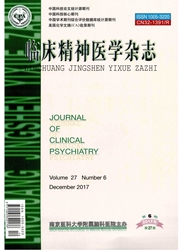

 中文摘要:
中文摘要:
目的:探讨双相Ⅱ型患者攻击行为与儿童期受虐情况和父母养育方式的关系。方法:根据外显版攻击行为量表(MOAS)评分将98例汉族双相Ⅱ型障碍患者分为攻击组(47例)及非攻击组(51例);采用自编一般情况问卷、儿童期虐待史自评量表(PRCA)和父母教养方式评价量表(EMBU)对两组患者进行调查、评估和比较。结果:攻击组PRCA中儿童期受躯体虐待分明显高于非攻击组;EMBU中父亲"惩罚、严厉"(21.28±8.70)评分及母亲"拒绝、否认"(16.79±8.14)、"惩罚、严厉"(15.43±7.79)评分明显高于非攻击组[(17.63±6.05)、(13.08±4.86)、(12.67±4.80)](P均〈0.05)。结论:双相Ⅱ型患者的攻击行为可能与其童年遭受躯体虐待和父母不良教育方式有关。
 英文摘要:
英文摘要:
Objective: To explore the relationship between aggressive behavior and childhood abuse or parental rearing patterns in patients with bipolar Ⅱ disorders. Method: According to the scores of modified overt aggression scales (MOAS) ,98 Han patients with bipolar II disorder were divided into aggressive behavior groups (47 cases) and non-aggressive behavior group (51 eases). They were investigated by a self-eompiled inventory, personal report of childhood abuse (PRCA) and parental rearing patterns self rating scale ( EMBU ). Results:In the aggressive behavior group, the score of childhood physical abuse in PRCA was significantly higher than the non-aggressive behavior group ( P 〈 0.05 ). The scores of fatherS" punishment, harsh" ( 21.28 ± 8.70) and the mother "refuse, deny" ( 16.79 ± 8.14 ), "punishment, harsh" ( 15.43 ± 7.79 ) in EMBU score were significantly higher than those in the non-aggressive behavior group [ ( 17.63± 6.05 ), ( 13.08 ± 4.86 ), ( 12.67 ±4.80 ) ] ( all P 〈 0. 05 ). Conclusion: The aggressive behavior of bipolar Ⅱ disorder patients may be correlated with the childhood physical abuse and unhealthy parental edueation.
 同期刊论文项目
同期刊论文项目
 同项目期刊论文
同项目期刊论文
 期刊信息
期刊信息
